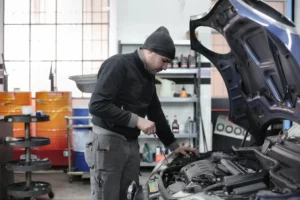
A leak in your engine is a big problem, and it will lead to some severe damage if you don’t take care of it. Oil leaks can cause significant problems when they get into the combustion chamber. This increases the risk of major engine failure.
Leaking oil also causes environmental pollution when released onto land or water sources. Can oil stop leak damage my engine? We will explore this question in this blog post.
What Is An Oil Stop Leak?
An oil stop leak is a car part that helps seal leaks in the engine. It’s made of a soft, pliable material that conforms to the shape of the hole and seals it tight. You can use the oil stop leak on any car, but it’s beneficial for those with older cars whose engines have begun to leak oil.
When an engine leaks oil, it can cause all sorts of problems. The oil can drip onto the hot exhaust system and start a fire, or it can contaminate the brake fluid. Using an oil stop leak is a great way to prevent these things from happening. It’s a quick and easy fix that will keep your car running smoothly.
If not sure whether your car needs an oil stop leak, bring it to a mechanic and have them take a look. They’ll be able to tell you if there are any leaks and, if so, will recommend the best oil stop leak for your car.
Can Oil Stop Leak Damage My Engine?
Yes, an oil stop leak will damage your engine in the long run. The main thing that you need to know is that the damage will be incremental. It won’t occur overnight.
The reason why oil stop leak works in the short-term is that it contains detergents and solvents that break down corrosion within your engine’s internal parts and clog up sludge deposits, so they don’t cause any more damage.
However, over time the oil stop leak additive will wear out, and your engine will start to show signs of the damage that did in the early stages of using the product.
If you’re experiencing an engine problem, it’s best to take it to a mechanic and have them look at it to determine the best course of action to take.
Factors To Consider When Buying A Car Oil Stop Leak
You should have in mind several factors when choosing a car oil stop leak. These include:
- The size of the leak: The product you choose should be able to handle the size of the leak.
- The type of engine: Not all stop leaks are compatible with every engine type. Choose one specifically designed for your car’s make and model.
- Your budget: Some products are more expensive than others. Consider how much you’re willing to spend before you make your purchase.
- The manufacturer’s reputation: Each car oil stop leak product has its own set of pros and cons. Before choosing one, check out the reviews from previous buyers to see if it works or not. If you choose a reputable brand with good customer service, they’ll be more than happy to address your concerns.
- The expiration date: Keep in mind that stop leak products eventually expire, much like food items.
- Your driving habits: If you’re a heavy driver, you may need to use a stop leak more often than someone who doesn’t drive as much.
These are just some of the factors you should consider when making your purchase. By taking all of them into account, you will be able to find the best car oil stop leak for your needs.
Ways To Make Your Engine Last Longer
There are different ways to make your engine last longer and perform better. Here are some of them: We will look at each of them in detail:
Keep your engine well-tuned
There is no point in a powerful engine if you cannot use it to its full potential. We should keep our cars regularly serviced and tuned to perform better.
The fuel we put into our engines impacts how well the car runs, too: using lower quality gasoline can result in poorer performance over time.
Get regular oil changes
The oil keeps the engine lubricated and helps it run smoothly. Replacing old or dirty oil with new, high-quality motor oil will give your car a performance boost over time.
Make sure the oil is of the correct grade and quality for your vehicle and that it changes at the recommended intervals. Using incorrect or low-quality oil can lead to accelerated engine wear.
Replace worn out parts
If an engine part has become worn down to the point of failure, replacing it is essential to keep the engine running smoothly for longer. You can replace engine parts and other car components yourself or take your vehicle to a specialist workshop for servicing.
Batteries, electrical cables, and other components wear out over time. Having them replaced before they fail will prevent significant problems with your car’s systems down the line. Replace any parts that seem worn or damaged as soon as possible to avoid big problems in the future.
Keep the air filter clean
The air filter keeps dirt and other particles out of the engine. If it becomes clogged, it can damage the engine. An air filter keeps dirt and particles out of the engine, preventing damaging clogging, leading to poor performance over time.
Replace it regularly according to the manufacturer’s recommendations. Cleaning is usually not enough if the filter is filthy.
Drive with care
Among the best ways to make sure your car lasts a long time is to drive carefully and avoid putting too much strain on the engine. Slamming on the brakes, driving too fast, and making sharp turns can all cause unnecessary wear and tear on your car.
Take it easy when you’re behind the wheel – gentle acceleration and braking will help keep your car in good condition for longer.
Use the correct fuel
Some fuels are better for certain engines than others – for example, using ethanol in a petrol engine can damage over time. Make sure you use the correct fuel for your car and that it is good quality.
Store your car properly
If you’re not going to use your car for a while, you must store it carefully. Keeping the fuel fresh and clean and replacing worn-out engine parts before storing helps keep engines in good condition when they are not in use.
Get regular servicing
Regularly getting your car serviced can help catch any potential issues with the engine before they cause damage. Getting your car regularly serviced also helps ensure that it is running as well as possible, which keeps fuel consumption low and reduces emissions.
Car Engine FAQs
What is the difference between an internal combustion engine and a diesel engine?
In short, nothing other than how heat energy from burning fuel is converted into mechanical work. Both engines use explosions to do this, with one key difference being that in an IC (internal combustion) engine, we want gas to expand rather than contract (compression is what creates the explosion). In contrast, in a diesel engine, it’s the opposite.
What are the different types of car engines?
The most common type of car engine is a gasoline or petrol engine. Other types of engines include diesel engines and electric cars. A gasoline engine is an internal combustion engine that runs on gasoline; the most common types are Otto cycle engines and Diesel-cycle engines.
A diesel or compression ignition engine is an internal combustion engine that uses ignited compressed air to push fuel into cylinders. It then explodes, doing work in the process (this differs from how petrol/gasoline engines use explosions to push the fuel-air mixture into the cylinders).
Why do I need to change the oil in my car?
The lubricating oil you put into your engine keeps it clean and free from corrosion. It also helps to reduce friction, which increases performance and makes cars last longer. Changing the oil regularly is a must for any vehicle owner. To change oil, you need an oil filter wrench, a new drain plug gasket (if needed), and the correct type of replacement engine oil.
How do I know when it’s time to change my car or truck’s spark plugs?
The most common symptom is less fuel economy, but others include excessive black soot on your tailpipe, misfiring, and knocking or pinging noises. A qualified technician can help you determine when your plugs need replacing. You should also replace your spark plugs every 30,000 miles or every two years, whichever comes first.
Conclusion
If you are looking for an immediate solution to your engine problem, an oil stop leak might be the answer. But if you want to keep your car running in tip-top shape, it’s best not to use this product at all! Every time you use an oil stop leak, there will be a small amount of damage to the engine block and other parts.
The real issue with using these products is that they mask the true cause of the problem, which could lead people into thinking their vehicle needs expensive repairs when just changing their oil regularly would solve everything.


